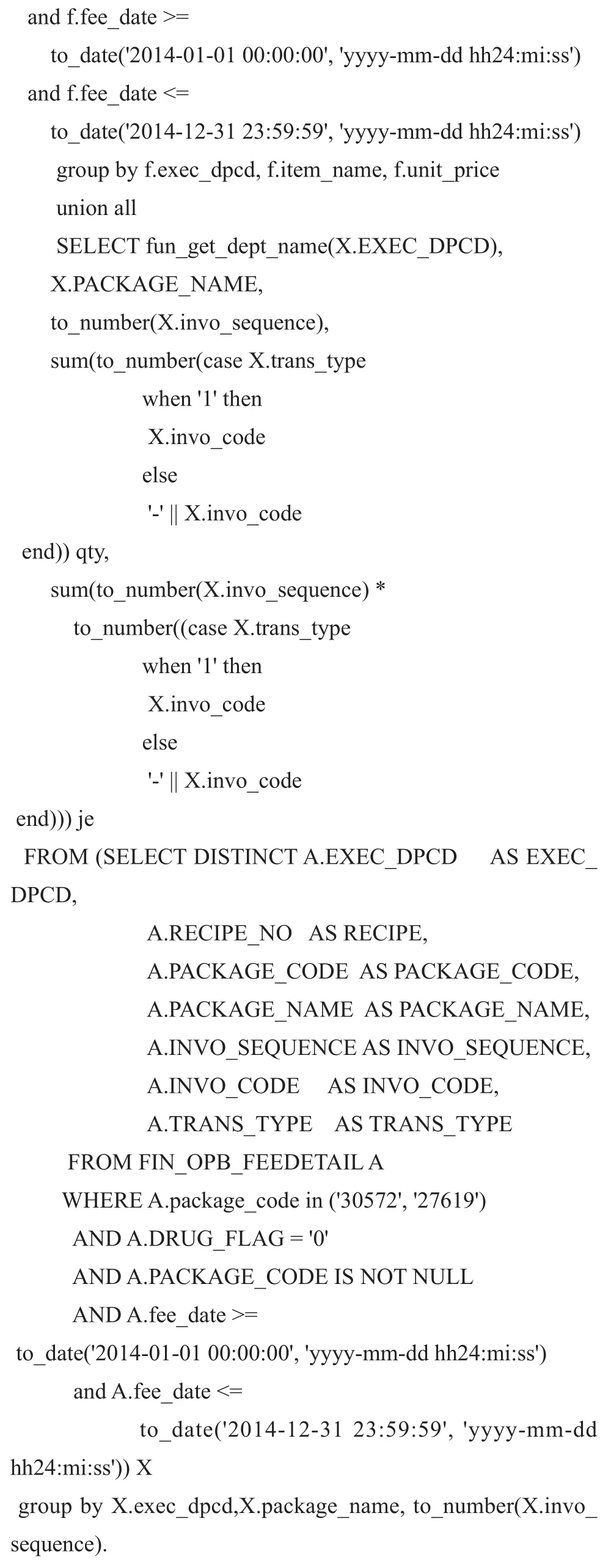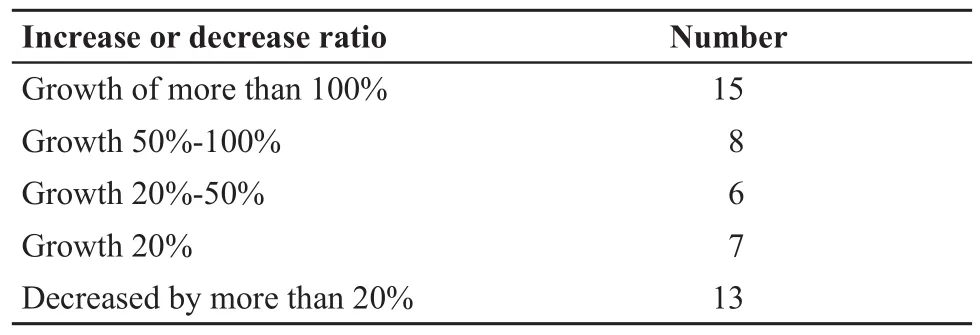Practice and Exploration of Economic Benefit Evaluation of Medical Equipment in Our Hospital
2016-03-02WeiweiShi
Wei-wei Shi
Department of Biomedical Engineering, Northern Jiangsu People’s Hospital, Yangzhou Jiangsu, 225000, China
Practice and Exploration of Economic Benefit Evaluation of Medical Equipment in Our Hospital
Wei-wei Shi
Department of Biomedical Engineering, Northern Jiangsu People’s Hospital, Yangzhou Jiangsu, 225000, China
ObjectiveThe evaluation index of medical equipment’s economic benefit is based on the usage of medical equipment, the traditional data collection method is time-consuming, laborious and not entirely accurate. The usage of medical equipment is obtained by designing data query statements from the HIS system.MethodsFirst the charging items are in correspondence with the device’s name included, second fees and other relevant data are extracted from charging module in HIS. Through a rough estimate of the recovery period and an increase or decrease ratio, the economic benefit of the medical equipment can be analyzed.ResultsThrough the method of the benefit analysis of the medical equipment, we can clearly f nd out the different economic benefit of the equipment, and f nally analyze the reasons.ConclusionPractice has proved that, this methad, it can greatly reduce human, material resources required in data collection and improve the accuracy of the data. It can help hospital managers timely to grasp the operating costs of medical equipment and other information, and also provide scientif c data for hospital managers when they purchase reasonable medical equipment.
economic benefit analysis of medical equipment; hospital information system; data query; charging items; program design
1 INTRODUCTION
With the rapid development of medical science and technology, the extensive use of advanced medical equipment has become a signif cant symbol of modern hospitals. The functional integrity and reliability of medical equipment directly related to the quality of medical work, and the hospital medical equipment continues to increase, making the purchase and use of medical equipment become an important part of the management of equipment[1]. In order to improve the management level of hospital medical equipment, make full use of the efficiency of medical equipment, improve the use rate of equipment, reduce or eliminate man-made damage, ensure medical equipment is in the best condition, how to establish effective medical equipment evaluation system is the key problem to be solved.
The new version of “three level general hospital’s assessment rules” in 2011 has the clear requirements: analysis and evaluation of large medical equipment in the way of use, functional development, cost-effectiveness; regular supervision of the issue to check whether it has been improved, analysis and evaluation report is provided to the equipment committee and feedback to therelevant departments; the results of analysis and evaluation report are used to adjust the relevant equipment procurement reference[2].
Our hospital set up a scientif c evaluation system for the use of medical equipment, the evaluation indicators include: evaluation of medical equipment economic benefits, social benefits evaluation of medical equipment, scientific research performance evaluation. Among them, the economic benefit evaluation index of medical equipment, which means the usage of equipment, income and other data are obtained by detailed records in charging module of HIS. On the basis of HIS database, the design of an object-oriented procedure can help extract using data of medical equipment easily. And we can quickly grasp the usage of medical equipment.
2 DATA SOURCES AND RESEARCH METHODS
2.1 Data sources
Our hospital in the past five years has been exploring the method of economic benefit evaluation, in 2012, through practical exploration, we develop online reporting plat for MOF the economic benefits of valuable equipment, and make online reporting work into a routine. According to the requirements and f xed time, the annual usage of equipment is reported. At the end of 2014, the charging items are in correspondence with the device’s name included, fees and other relevant data are extracted from charging module in HIS. Through roughly estimated recovery period and increase or decrease ratio, the economic benefits of medical equipment can be analyzed. By this way of extracting the data, the error of data reported manually is greatly reduced, the accuracy of the data is improved.
The number of the devices included is 74. With joint investigation of Price Department and Information Department in our hospital, we match the charging items with medical equipment names. Through checking hospital information system’s database Oracle 10 g, we extract total amount, unit price, charge and other related data monthly in 2014.Related statements are as follows:


2.2 Research method
Through querying hospital information system’s database Oracle 10 g, we obtained total amount, unit price, charging items and other related data monthly in 2014. Calculation ofthe recovery period (years): equipment value/(monthly income - monthly expense)/12 (human costs, equipment depreciation, water and electricity consumption and so on are not calculated).

Table 1 benefit analysis of expensive medical equipment (in part)
3 RESULTS AND ANALYSIS
3.1 Results
The unit price of all medical equipment included is over 100000 ¥. Among them, the unit price over 500000 ¥ is 54, accounting for 73%. Medical equipment included is related to 62 charging projects, involving 40 clinical medical departments. Roughly estimated recovery period and increase or decrease ratio of medical equipment’s usage included are seen on Table 1.
3.2 Analysis
Table 2 can be seen, the number of medical equipment, whose recovery period is less than 5 years, is only 38 units, accounting for 51.3%; whose recovery period is over 10 years, is 30 units, accounting for 40.5%; whose recovery period is over 50 years is 8 units, accounting for 10.8%. Table 3 can be seen, increase or decrease ratio of medical equipment’s usage compared to 2013: the number of medical equipment whose increase ratio in use is over 100% (substantial growth) is 15 units, accounting for 20%; whose increase ratio in use is over 50% (significantly improved) is 8 units, accounting for 11%; whose decrease ratio in use is over 20% (signif cantly decreased) is 13 units, accounting for 17.5%.

Table 2 Analysis of medical equipment’s recovery period estimated roughly (yr)

Table 3 Increase or decrease percentage compared with 2013
And some medical equipment whose recovery period is over 10 years and usage is declining compared to the same period in 2013, for example: body composition analyzer (Department of Clinical Nutrition), automatic platelet aggregation analyzer (Hematology Laboratory), three-dimensional electrophysiological mapping (Cardiology), medical infrared thermal imaging instrument (Department of Pain Medicine), ultrasonic and pneumatic lithotripsy machine (Urology), RF cold plasma surgery system (Orthopedics), corneal topography (Ophthalmology), BIS monitor (ICU)etc.These devices have been low eff ciency for a long time, even the idle status.
In view of the low economic efficiency of the equipment, the investigation is found that some devices are not fully demonstrated before the purchase, such as: economic benefits, technical feasibility, supporting conditions, technology advance and other aspects, which lead to blind introduction, repeat purchase, excessive pursuit of high, f ne, sharp equipment and other issues in the process of purchasing, totally ignoring the effectiveness of the devices. There are some other devices[3]. Although the low economic efficiency, they play a great role in making a lot of achievements in scientific research in the development of new technology and new projects, and in social benefits. According to equipment evaluation indicators, these devices play a great role.
4 CONCLUSION
Based on HIS charge system, through the correspondence between charging items and medical equipment, the basic data query is achieved. Number, cost, total income and other data do not need to be manually filled, greatly reduce the human and material resources required for usage statistics of medical equipment, to ensure the accuracy of statistical data.
The correspondence between medical equipment and charging items makes the analysis of economic benefit of medical equipment more simple, quick and accurate. Hospital managers can timely grasp increase or decrease ratio of medical equipment’s usage, compared to the same period in different years, and then to provide scientific data for the purchase of equipment. Especially to provide accurate basis for similar types of equipment, which eliminates the blindness and randomness in the purchase of equipment. And we need to learn the actual needs of the hospital and similar types of equipment’s usage before purchasing. With the aid of medical equipment information management tool, we can not only improve the management level of medical equipment analysis and evaluation, but the huge role of medical engineering department will continue to show in the hospital’s management as well[4].
[REFERENCES]
[1]Ling J,Ye XF,Li SQ.Benefit analysis of large medical equipment introduced in the past 3 years in a hospital[J].Yiliao Zhuangbei, 2011,32(10):103-104.
[2]Shi WW,Zhong H,Xie FM.Analysis of the monitoring method of equipment usage[J].Yiliao Zhuangbei,2013,34(12):108-109.
[3]Zheng XX,Li YY.Status and countermeasures of medical equipment purchase and equipment management in hospital[J].Yiliao Zhuangbei,2008,29(1):67-68.
[4]Shi WW.Practice and exploration of medical equipment information management[J].Yiliao Zhuangbei,2010,31(12):250-254.
专栏——脑网络分析与类脑计算
编者按:脑网络分析是大脑与复杂网络理论相结合的产物,脑网络由脑区节点和节点间的连接边两个基本要素构成。基于图论的方法,研究者们可以从微观尺度(神经元)、中间尺度(神经集群)和大尺度(脑区)等多个不同尺度上对大脑网络进行分析。近十年,世界各国都纷纷发展以脑网络研究为主题的大型科学计划,如人脑连接组计划(Human Connectome Project,HCP)等。类脑计算是指借鉴神经元间的互相合作的工作机制,模仿人脑功能进行计算,以类脑的方式形成大规模并行处理的网络。通过对大脑网络运行机制的了解,可以促进类脑技术的创新。同时,类脑计算也为脑科学数据处理提供了新的方法。本专栏主要围绕脑网络分析和类脑计算,这两个可以相互借鉴、相互融合的前沿领域而展开论述,主要介绍了深度学习算法在脑科学领域中的前沿应用,基于网络分析的人脑认知储备的定量预测,以及小鼠大脑个体结构网络的构建。

栏目主编:林岚
林岚 ,北京工业大学生物医学工程系副教授。从事运用神经影像学方法,研究与年龄相关的大脑认知退化方面的研究工作。2006年于美国亚利桑那州立大学获得生物工程博士学位。2006~2011年在美国亚利桑那州立大学和亚利桑那大学从事神经影像学方面的研究工作。运用现代神经图像处理与分析方法对健康人大脑的认知储备及阿兹海默症的发生、发展过程进行研究。2012年加入北京工业大学生物医学工程系。共发表科技论文70余篇,其中16篇文章被SCI/EI检索收录。现系【美】神经科学学会会员、【美】Mcknight大脑研究学会会员。多年来还作为课题负责人和主要参与者完成了一项北京市自然科学基金,两项亚利桑那州基金,多项NIA(美国国家老年研究院基金)项目和NIH(美国国家卫生研究院基金)项目。
R318 [Document code]A
10.3969/j.issn.1674-1633.2016.12.001
1674-1633(2016)12-0001-03
Wei-wei Shi, Department of Biomedical Engineering, Northern Jiangsu People’s Hospital, 98 Nantong West Road, Yangzhou 225000, Jiangsu Province, China. 71227482@qq.com
